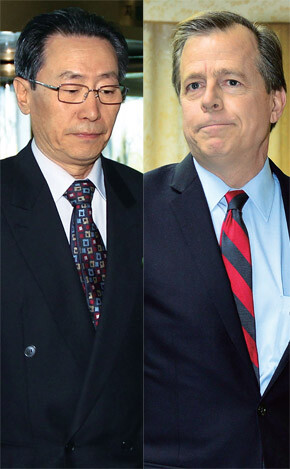hankyoreh
Links to other country sites 다른 나라 사이트 링크
Little progress in talks on resuming six-party talks

By Seong Yeon-cheol and Park Hyun, Beijing and Washington correspondents
American and Chinese delegates to the six-party talks met in New York and Washington last week, but there was reportedly no discernible progress on methods of resuming the six-party talks in order to find a solution to the North Korean nuclear issue.
According to various sources, Wu Dawei, China’s special representative for Korean Peninsula Affairs, told reporters after the talks that the two sides had narrowed their differences, but this description is at odds with what was actually discussed during the negotiations. The North Korean proposal for negotiations offered by Wu, who had visited Pyongyang the previous month, and the proposal for negotiations offered by the US fell short of both implementing the agreement reached on Feb. 29, 2012.
Along with insisting on unconditional talks, North Korea is calling for the US and South Korea to stop holding joint military exercises and to end their policy of hostility toward the North. Pyongyang is urging its counterparts to meet for negotiations without any preconditions, saying that everything is open for discussion.
The US, on the other hand, is holding to its standard position that North Korea must first take measures to demonstrate its sincerity about denuclearizing. The US promised to provide North Korea with 240,000 tons of food during the Feb. 29 agreement of 2012, but now it is suggesting that it cannot even do that. “The gap between the positions of North Korea and the US is too wide for China to bridge,” a source said on condition of anonymity.
In response to these developments, China asked the US to give ground in order to reach a breakthrough in the impasse. While China acknowledges the necessity of preliminary measures, it has asked the US to relax its requirements, in consideration of North Korea’s opposition. In response to this, the US indicated that it has no intention of yielding and asked China to put more pressure on North Korea.
As a result, the prevailing view is that US President Barack Obama will not have any new message to offer North Korea during his visit to South Korea, which begins on Apr. 25. As long as President Park Geun-hye does not take any action during the summit to change Obama’s attitude, it is likely that the deadlock between North Korea and the US will drag on.
Diplomats in Washington believe that the next two or three weeks will be an important time that will determine whether the situation will get worse or whether talks will resume. “If the next few weeks go by uneventfully, an atmosphere for talks could be formed, but if a nuclear test is held, the situation could get out of control once again,” a diplomatic source in Washington said.
Please direct questions or comments to [english@hani.co.kr]

Editorial・opinion
![[Column] Park Geun-hye déjà vu in Yoon Suk-yeol [Column] Park Geun-hye déjà vu in Yoon Suk-yeol](https://flexible.img.hani.co.kr/flexible/normal/500/300/imgdb/original/2024/0424/651713945113788.jpg) [Column] Park Geun-hye déjà vu in Yoon Suk-yeol
[Column] Park Geun-hye déjà vu in Yoon Suk-yeol![[Editorial] New weight of N. Korea’s nuclear threats makes dialogue all the more urgent [Editorial] New weight of N. Korea’s nuclear threats makes dialogue all the more urgent](https://flexible.img.hani.co.kr/flexible/normal/500/300/imgdb/original/2024/0424/7317139454662664.jpg) [Editorial] New weight of N. Korea’s nuclear threats makes dialogue all the more urgent
[Editorial] New weight of N. Korea’s nuclear threats makes dialogue all the more urgent- [Guest essay] The real reason Korea’s new right wants to dub Rhee a founding father
- [Column] ‘Choson’: Is it time we start referring to N. Korea in its own terms?
- [Editorial] Japan’s rewriting of history with Korea has gone too far
- [Column] The president’s questionable capacity for dialogue
- [Column] Are chaebol firms just pizza pies for families to divvy up as they please?
- [Column] Has Korea, too, crossed the Rubicon on China?
- [Correspondent’s column] In Japan’s alliance with US, echoes of its past alliances with UK
- [Editorial] Does Yoon think the Korean public is wrong?
Most viewed articles
- 1‘We must say no’: Seoul defense chief on Korean, USFK involvement in hypothetical Taiwan crisis
- 2N. Korean delegation’s trip to Iran shows how Pyongyang is leveraging ties with Moscow
- 3‘Weddingflation’ breaks the bank for Korean couples-to-be
- 4Will NewJeans end up collateral damage in internal feud at K-pop juggernaut Hybe?
- 546% of cases of violence against women in Korea perpetrated by intimate partner, study finds
- 6[Column] Park Geun-hye déjà vu in Yoon Suk-yeol
- 7“Parental care contracts” increasingly common in South Korea
- 8[Column] Yoon’s first 100 days should open our eyes to pitfalls of presidential system
- 9[Interview] Dear Korean men, It’s OK to admit you’re not always strong
- 10[Editorial] New weight of N. Korea’s nuclear threats makes dialogue all the more urgent